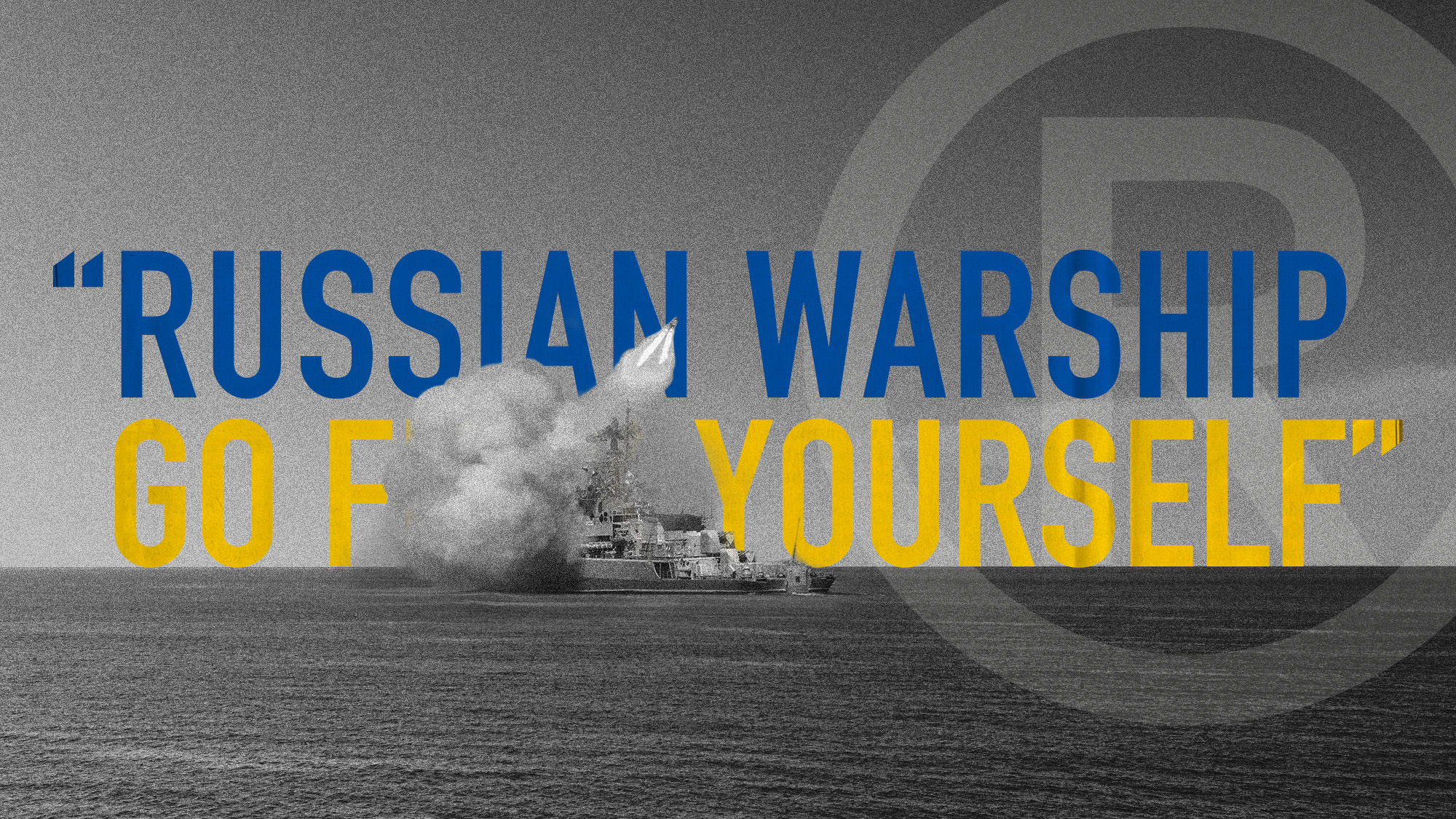The trademark battle over the 'Russian warship, go f**k yourself' slogan
Row over the 'brave' response from a Ukrainian soldier to a Moscow warship that's become 'hot merchandising property'

A free daily email with the biggest news stories of the day – and the best features from TheWeek.com
You are now subscribed
Your newsletter sign-up was successful
Ukraine's colourful war slogan "Russian warship, go f**k yourself" is at the centre of a trademark spat between Ukraine's State Border Guard and the European Union Intellectual Property Office (EUIPO).
The "expression of defiance" has become a symbol of "resistance" since it was "first uttered" in a "brave" response from a Ukrainian soldier to a Moscow warship as it prepared to attack Snake Island in the opening hours of the invasion, recalled Politico.
But the ruling from EU intellectual property enforcers that it does not meet the requirement to become a trademark has left Ukraine's border guards "baffled".
The Week
Escape your echo chamber. Get the facts behind the news, plus analysis from multiple perspectives.

Sign up for The Week's Free Newsletters
From our morning news briefing to a weekly Good News Newsletter, get the best of The Week delivered directly to your inbox.
From our morning news briefing to a weekly Good News Newsletter, get the best of The Week delivered directly to your inbox.
'Priggish and pompous'
The soldier who coined the phrase was captured by Russia and later freed in a prisoner swap, and two Brussels-based lawyers originally filed the trademark application in March 2022, under his name, with the approval of his family.
The duo argued that it was a "unique opportunity to do something bigger", to prevent someone else claiming the trademark and to avoid anyone else profiting from the phrase. A "variety of commercial products" featuring variations of the words are being sold on "multiple shopping platforms", said Politico.
The saying "quickly became hot merchandising property", said Andrew Tettenborn, professor of law at Swansea Law School, in The Spectator, and Andriy Demchenko, spokesperson for the Ukrainian Border Guard Service, warned in Politico that people with "insincere intentions" were seeking to cash in on the slogan's popularity.
After the initial filing, it "didn't take long" for the EU office to "dump cold water on Ukraine's case", said Politico. The EUIPO said the slogan would be perceived as "contrary to accepted principles of morality" as it sought financial gain from what is "universally accepted to be a tragic event".
A free daily email with the biggest news stories of the day – and the best features from TheWeek.com
When a second application was made in December 2022, this time in the name of the Ukrainian Border Guard, Europe rejected it again. It argued that the motto uses "vulgar language with an insulting sexual connotation" and "banalises the Russian invasion and uses the sign as merely a tool to sell merchandising goods such as jewels, toys, clothing, wallets, etc".
Andrej Bukovnik, one of the lawyers behind the claim, insisted that the slogan is a "freedom of expression", uttered in a "special moment" and that "you cannot censor people in situations like that". But an appeal filed in February 2023 was also dismissed, with examiners ruling that the phrase lacks "distinctive character".
The "priggish" and "pompous" arguments from "the cream of Europe's intellectual property lawyers" certainly "haven't lacked variety", said Tettenborn. The lawyers are determined to win the case and have filed a fresh appeal.
Supporters of their bid have noted that, in March 2022, the Ukrainian government chose an image commemorating the slogan for an official postage stamp as the "besieged country" tried to "keep morale high and win the PR battle against invading Russian forces", reported The Guardian.
'Eye-catching and exclusive'
Eleonora Rosati, professor of intellectual property law at Stockholm University, told Politico that the lawyers have little hope of winning as cases like this "rarely have happy endings". She cited several examples of failed trademark applications – from “Je suis Charlie” to “Black Lives Matter” – which faced similar obstacles.
But if the European lawyers have "taken to heart" the dangers of allowing commonplace political slogans to become anyone's exclusive property, it "seems odd", said Tettenborn, because this is not a "commonplace political phrase on everyone's lips", like "Black Lives Matter". It's "more like something eye-catching and exclusive", such as the 'England's Glory' motif that used to appear on Bryant & May matchboxes.
He suggested that this could be "an opportunity for London to score a post-Brexit trick", if the UK invited Ukraine's president Volodymyr Zelenskyy to apply to register the trademark here. After all, he argued, the slogan is "hardly more scabrous" than the French Connection UK trademark FCUK, which was registered in the UK nearly 20 years ago.
It would be a "nice showing of solidarity with the underdog", and sometimes, "even in the dry-as-dust area of trademark law", it's "the thought that counts".
Chas Newkey-Burden has been part of The Week Digital team for more than a decade and a journalist for 25 years, starting out on the irreverent football weekly 90 Minutes, before moving to lifestyle magazines Loaded and Attitude. He was a columnist for The Big Issue and landed a world exclusive with David Beckham that became the weekly magazine’s bestselling issue. He now writes regularly for The Guardian, The Telegraph, The Independent, Metro, FourFourTwo and the i new site. He is also the author of a number of non-fiction books.